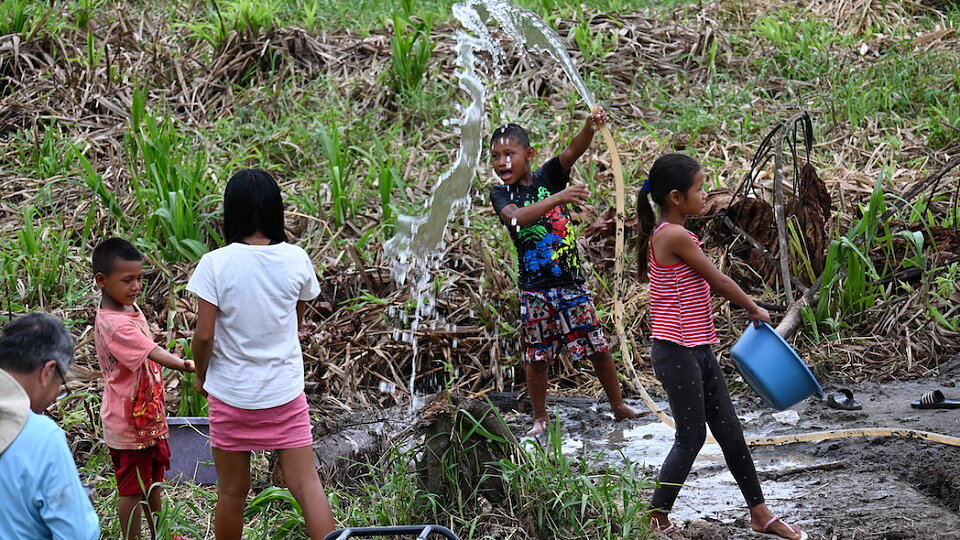Even in a place surrounded by water, clean drinking water can be hard to acquire. In October, a team of seven TBM volunteers helped drill a water well and start a church building for an Amazon River island village in Peru, the latest TBM effort to provide clean water and living water in the remote region.
TBM purchased drilling equipment in 2019 for a ministry called Access Water Peru. The new well in San Pedro became the first TBM Water project since the pandemic and will radically change the community.
“You can see the Amazon from the village, but the river water is never clear in this area because it has a very muddy bottom,” said Mitch Chaman, TBM Water director who led the volunteers. “It looks like chocolate milk.”
Villagers normally get their drinking water by capturing rain from their roofs and from “what they call a lake half a kilometer from the village,” Chapman said. The lake is formed by water which remains after Amazon flooding. It is muddy and is a breeding ground for anacondas. As for the captured rainwater, it flows along metal roofs and drains and can sit stagnant for days.
The new well hit water at a depth of 26 meters and went down another five meters to determine the depth of the water sand from which drinking water is extracted, Chapman said. “We had no problems. We set up the drill in about a day and a half and drilled for 4½ hours. After setting the well casing, we flushed the well until we got clear water.”
“It was the neatest thing to watch when all of the kids and some adults were playing in the water and laughing,” Chapman said. “Most have never seen flowing water out of a pipe.”
The TBM team reached the island by flying to Lima, Peru, then taking another flight over the Andes mountain range to Iquitos, followed by an almost two-hour riverboat trip. San Pedro residents can reach the outside world only via the river.
The first well is simply a beginning. The TBM crew continued work on a platform dwelling where this and future mission teams can eat and sleep. “This first team walked about 30 minutes to the drill site. Future teams will work their way down the river, drilling wells in different villages within a 30-minute boat trip,” Chapman said. Twenty-five more village wells can be staged from this location using the drilling rig provided by TBM.
Beyond the cost of the rig, each well costs between $8,000 and $14,000 in supplies and ongoing maintenance across the world, Chapman said. The price varies by region and available infrastructure. Drilling rigs cost $18,000-$45,000 depending on the type and region.
“As TBM donors give, we are able to provide wells in places around the world where clean drinking water is needed,” Chapman said. “And as TBM volunteers step forward we are able to help provide workers for both labor and ministry through churches in those places.”
TBM facilitates the process in different countries by working with local ministries. Keny Ojanama, of Access Water Peru, did the advance work for the October TBM trip. Churches along the Amazon make their request to Ojanama and he sets priorities based on location and distance from drinkable water, Chapman said.
“Before our team went to Peru, Keny determined that the big problem in this village was how dirty the water was becoming” because villagers used the lake water for all of their water needs, Chapman noted. “The water gets very soapy and contaminated as it gets lower.”
On the plus side, the Peruvian villagers have plenty of healthy food. “They will never starve to death,” Chapman said. Fresh fruit and fish are plentiful and free. There is no refrigeration or electricity, so villagers gather food each day for consumption. And, thanks to the chickens, the TBM team joined villagers in eating lots of eggs.
The TBM team included seven men and one woman. They flew out of Dallas/Fort Worth Oct. 7 and returned Oct. 18.
TBM Water projects include other work to support churches and their ministries. The Peru team began construction of a new church building, with the elevated platform floor and roof being completed by the team. They also shared the Gospel with children through varied activities and with adults through preaching and teaching.
Teams also include people with varied abilities and strengths. Noel Tucker served as team photographer, children’s minister, and all around support. It was her first “formal” mission experience.
“Being a mom, athlete, open water sailor, and attorney my brain is always ‘on’ and covers a lot of ground in this type of environment,” Tucker said. “Because I was not specifically tasked for most of the day, … I could see to minor health/injury issues and do whatever physical labor was needed that didn’t need direct supervision. I pretty much always had something in my day pack to accommodate the need. I thoroughly enjoyed that part of the service as well.”
The trip has given Tucker much to reflect on since returning. She is still meditating on the “difference between their [the villagers’] existence and ours in the U.S. Their lives are boiled down to the basics of food, shelter, procreating and hopefully developing their relationship with Jesus.
“They have all day and need all day to manage those tasks. We fill our days with so much unnecessarily, partly due to advancements in civilization but also because we are materialistic and enjoy our creature comforts,” she said. “There is a lesson in there somewhere.”

